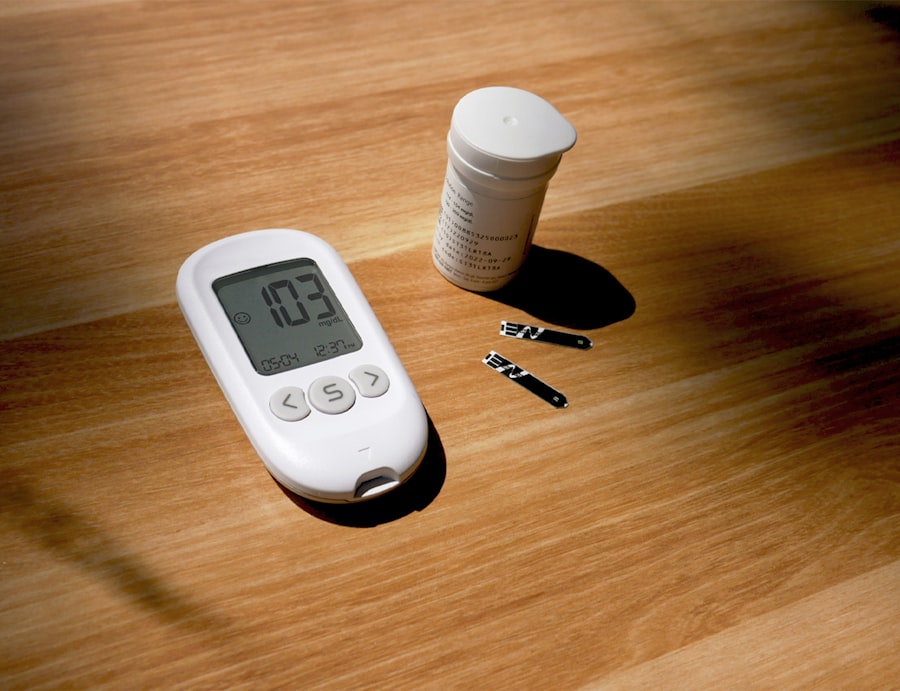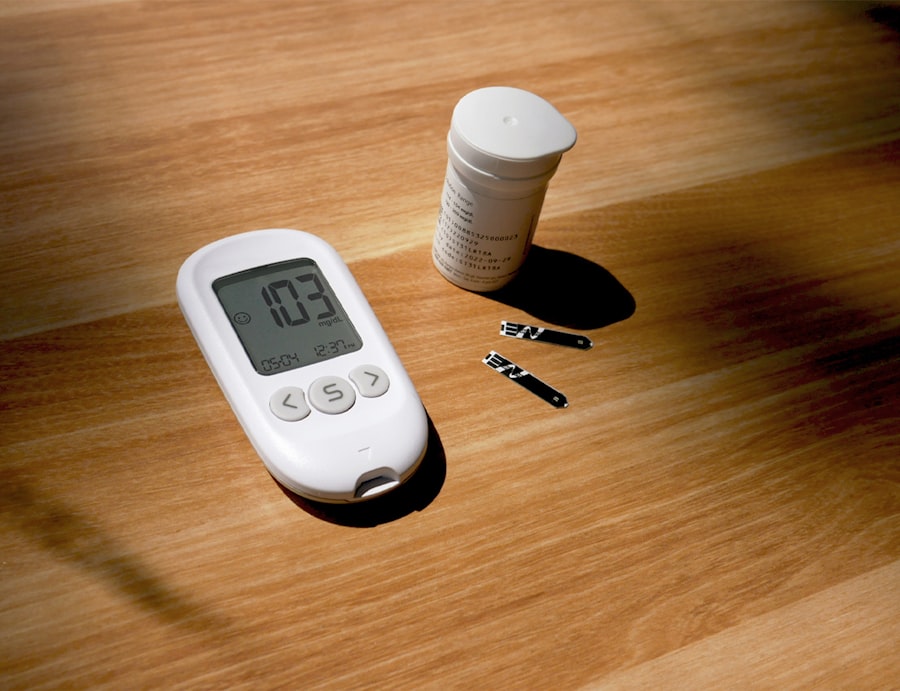When you wake up in the morning, your body is transitioning from a fasting state to one where it begins to process food and energy. This transition is crucial, as it sets the tone for your day. Morning blood sugar levels can be influenced by various factors, including your diet, physical activity, stress levels, and even your sleep quality.
Understanding how these elements interact can empower you to take control of your health and manage your blood sugar more effectively. In the early hours, your body releases hormones like cortisol and glucagon, which can raise blood sugar levels. This natural phenomenon is known as the dawn phenomenon.
For some individuals, particularly those with diabetes or insulin resistance, this can lead to elevated morning blood sugar levels that may require attention. By recognizing the factors that contribute to these levels, you can better prepare yourself to make informed choices that promote stable blood sugar throughout the day.
Key Takeaways
- Morning blood sugar levels can be affected by various factors such as diet, exercise, stress, and sleep.
- Lowering morning blood sugar is important for overall health and reducing the risk of complications related to diabetes.
- Diet and nutrition play a crucial role in managing morning blood sugar levels, including consuming a balanced breakfast and monitoring carbohydrate intake.
- Regular exercise can help lower morning blood sugar levels by increasing insulin sensitivity and promoting glucose uptake by muscles.
- Stress management techniques such as meditation, deep breathing, and yoga can help lower morning blood sugar levels by reducing cortisol levels and promoting relaxation.
Importance of Lowering Morning Blood Sugar
Lowering your morning blood sugar is essential for maintaining overall health and well-being. High blood sugar levels in the morning can lead to a range of complications, including fatigue, irritability, and difficulty concentrating. Over time, consistently elevated blood sugar can increase the risk of serious health issues such as heart disease, kidney damage, and nerve problems.
By focusing on lowering your morning blood sugar, you are taking proactive steps to safeguard your long-term health. Moreover, managing your morning blood sugar can significantly improve your quality of life.
This stability allows you to engage more fully in daily activities and enjoy a more active lifestyle. By prioritizing this aspect of your health, you are investing in a brighter and more vibrant future.
Diet and Nutrition Tips for Lowering Morning Blood Sugar

Your diet plays a pivotal role in regulating your morning blood sugar levels. To start, consider incorporating more whole foods into your meals. Foods rich in fiber, such as whole grains, fruits, and vegetables, can help slow down the absorption of sugar into your bloodstream.
This gradual release of glucose can prevent spikes in blood sugar levels and promote a more stable state throughout the morning. Additionally, be mindful of your carbohydrate intake. Opt for complex carbohydrates over simple sugars, as they are digested more slowly and have a lesser impact on blood sugar levels.
Pairing carbohydrates with protein or healthy fats can also help mitigate blood sugar spikes. For instance, enjoying oatmeal topped with nuts or yogurt can provide a balanced breakfast that supports stable energy levels.
The Role of Exercise in Lowering Morning Blood Sugar
| Exercise Type | Duration | Frequency | Effect on Morning Blood Sugar |
|---|---|---|---|
| Aerobic | 30 minutes | 5 times per week | Decreases blood sugar levels |
| Resistance Training | 20 minutes | 3 times per week | Improves insulin sensitivity |
| High-Intensity Interval Training (HIIT) | 15 minutes | 3 times per week | Reduces fasting blood sugar |
Exercise is another powerful tool in managing morning blood sugar levels.
Whether it’s a brisk walk, a cycling session, or a yoga class, finding an activity you enjoy can make it easier to incorporate regular exercise into your routine.
Moreover, exercising in the morning can be particularly beneficial for those looking to lower their blood sugar levels. Morning workouts can enhance insulin sensitivity throughout the day, making it easier for your body to regulate blood sugar levels after meals. Even short bursts of activity can have a positive impact; consider starting your day with a quick workout or stretching session to kickstart your metabolism and set a healthy tone for the day ahead.
Stress Management Techniques for Lowering Morning Blood Sugar
Stress is often an overlooked factor that can significantly impact your morning blood sugar levels. When you experience stress, your body releases hormones like cortisol and adrenaline, which can lead to increased blood sugar levels. Therefore, finding effective stress management techniques is crucial for maintaining stable blood sugar.
Consider incorporating mindfulness practices into your daily routine. Techniques such as meditation, deep breathing exercises, or yoga can help reduce stress and promote relaxation. Even taking a few moments each morning to focus on your breath or set positive intentions for the day can create a sense of calm that carries through to your blood sugar management efforts.
Medication and Supplements for Lowering Morning Blood Sugar

For some individuals, lifestyle changes alone may not be sufficient to manage morning blood sugar levels effectively. In such cases, medication may be necessary. Various medications are available that can help regulate blood sugar levels by improving insulin sensitivity or reducing glucose production in the liver.
If you find yourself struggling with high morning blood sugar despite making dietary and lifestyle changes, consulting with a healthcare professional about medication options may be beneficial. In addition to prescription medications, certain supplements may also support blood sugar management. For example, chromium and alpha-lipoic acid have been studied for their potential benefits in improving insulin sensitivity.
However, it’s essential to approach supplements with caution and consult with a healthcare provider before adding them to your regimen to ensure they are appropriate for your individual needs.
Monitoring and Tracking Morning Blood Sugar Levels
Monitoring your morning blood sugar levels is a vital aspect of managing your health effectively. Regularly checking your blood sugar allows you to identify patterns and understand how different factors—such as diet, exercise, and stress—affect your levels. This information can empower you to make informed decisions about your lifestyle choices.
Consider keeping a journal or using a mobile app to track your readings over time. Documenting not only your blood sugar levels but also what you eat and how you feel can provide valuable insights into what works best for you. By analyzing this data, you can make adjustments to your routine that promote better blood sugar control and overall well-being.
The Impact of Sleep on Morning Blood Sugar Levels
Sleep is often underestimated when it comes to managing morning blood sugar levels. Poor sleep quality or insufficient sleep can lead to increased insulin resistance and elevated blood sugar levels upon waking. Prioritizing good sleep hygiene is essential for maintaining stable blood sugar throughout the night and into the morning.
To improve your sleep quality, establish a consistent bedtime routine that promotes relaxation. This might include winding down with calming activities such as reading or taking a warm bath before bed. Additionally, creating a sleep-friendly environment—darkening the room, reducing noise, and keeping the temperature comfortable—can enhance the quality of your rest and positively impact your morning blood sugar levels.
Hydration and Its Effect on Morning Blood Sugar
Staying adequately hydrated is another crucial factor in managing morning blood sugar levels. Dehydration can lead to higher concentrations of glucose in the bloodstream, resulting in elevated blood sugar readings. Therefore, ensuring you drink enough water throughout the day is essential for optimal health.
Consider starting each morning with a glass of water to rehydrate after a night’s sleep. This simple habit can help kickstart your metabolism and support overall bodily functions. Additionally, incorporating hydrating foods such as fruits and vegetables into your diet can further enhance your hydration efforts while providing essential nutrients that support stable blood sugar levels.
Tips for Creating a Morning Routine to Lower Blood Sugar
Establishing a consistent morning routine can significantly impact your ability to manage morning blood sugar levels effectively. Start by setting aside time for breakfast that includes balanced nutrients—aim for a combination of protein, healthy fats, and complex carbohydrates to fuel your body without causing spikes in blood sugar. Incorporate movement into your morning routine as well; even light stretching or a short walk can help stimulate circulation and promote better glucose utilization.
Additionally, consider integrating mindfulness practices such as meditation or journaling into your mornings to set a positive tone for the day ahead.
Seeking Professional Help for Managing Morning Blood Sugar
If you find yourself struggling to manage your morning blood sugar levels despite making lifestyle changes, seeking professional help may be necessary. A healthcare provider or registered dietitian can offer personalized guidance tailored to your specific needs and circumstances. Working with professionals allows you to develop a comprehensive plan that addresses all aspects of your health—diet, exercise, medication management, and more.
They can also provide ongoing support and accountability as you navigate the challenges of managing blood sugar levels effectively. In conclusion, understanding and managing morning blood sugar levels is crucial for maintaining overall health and well-being. By focusing on diet, exercise, stress management, sleep quality, hydration, and professional guidance when needed, you can take proactive steps toward achieving stable blood sugar levels each morning and throughout the day.
Managing morning blood sugar levels is crucial for individuals with diabetes, as elevated levels can lead to various health complications. One effective strategy is to engage in regular physical activity, which helps improve insulin sensitivity and lower blood sugar levels. Additionally, consuming a balanced diet rich in fiber and low in refined sugars can significantly impact morning glucose levels. For more detailed strategies and tips on managing blood sugar, you can read a related article on this topic by visiting Explore Senior Health. This resource provides valuable insights and practical advice for maintaining healthy blood sugar levels throughout the day.
WATCH THIS!🧠 The Breakfast Mistake That Fuels Senior Memory Loss
FAQs
What causes high blood sugar in the morning?
High blood sugar in the morning, also known as dawn phenomenon, can be caused by the body’s natural release of hormones like cortisol and adrenaline, which can lead to increased insulin resistance and higher blood sugar levels.
How can I lower my blood sugar in the morning?
To lower blood sugar in the morning, you can try exercising in the evening, eating a balanced dinner with a good mix of protein, healthy fats, and complex carbohydrates, and ensuring you get enough sleep.
What foods can help lower blood sugar in the morning?
Foods that can help lower blood sugar in the morning include high-fiber foods like whole grains, fruits, and vegetables, as well as lean proteins and healthy fats.
Can medication help lower blood sugar in the morning?
For some people with diabetes, medication may be necessary to help lower blood sugar in the morning. It’s important to work with a healthcare provider to determine the best treatment plan.
Are there any lifestyle changes that can help lower blood sugar in the morning?
Yes, lifestyle changes such as regular exercise, maintaining a healthy weight, and managing stress can all help lower blood sugar in the morning. It’s important to work with a healthcare provider to develop a comprehensive plan.
